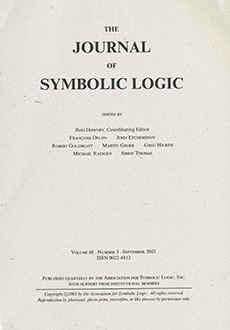Abstract
We investigate logical consequence in temporal logics in terms of logical consecutions, i.e., inference rules. First, we discuss the question: what does it mean for a logical consecution to be ’correct’ in a propositional logic. We consider both valid and admissible consecutions in linear temporal logics and discuss the distinction between these two notions. The linear temporal logic LDTL, consisting of all formulas valid in the frame 〈 𝒵, ≤, ≥ 〉 of all integer numbers, is the prime object of our investigation. We describe consecutions admissible in LDTL in a semantic way—via consecutions valid in special temporal Kripke/Hintikka models. Then we state that any temporal inference rule has a reduced normal form which is given in terms of uniform formulas of temporal degree 1. Using these facts and enhanced semantic techniques we construct an algorithm, which recognizes consecutions admissible in LDTL. Also, we note that using the same technique it follows that the linear temporal logic ℒ(𝒩) of all natural numbers is also decidable w.r.t. inference rules. So, we prove that both logics LDTL and ℒ(𝒩) are decidable w.r.t. admissible consecutions. In particular, as a consequence, they both are decidable (known fact), and the given deciding algorithms are explicit.
Citation
V. V. Rybakov. "Logical consecutions in discrete linear temporal logic." J. Symbolic Logic 70 (4) 1137 - 1149, December 2005. https://doi.org/10.2178/jsl/1129642119
Information





